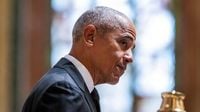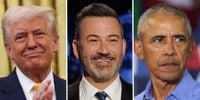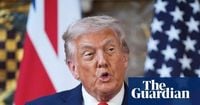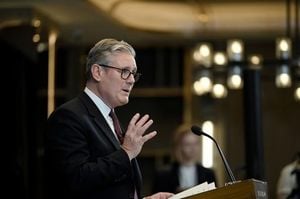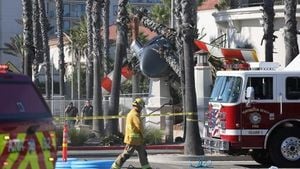In a stunning escalation of the ongoing battle over free speech and media independence in the United States, the suspension of late-night host Jimmy Kimmel by ABC has ignited fierce debate across the political spectrum. The controversy, which erupted following Kimmel’s on-air remarks about the murder of conservative activist Charlie Kirk, has drawn in some of the country’s most prominent political figures—including former President Barack Obama and current President Donald Trump—while raising urgent questions about the boundaries between government power, media freedom, and the right to dissent.
The saga began on September 15, 2025, when Kimmel used his opening monologue to address the tragic death of Kirk, who was shot while speaking at Utah Valley University. Kimmel accused the “MAGA gang” of attempting to use Kirk’s murder to score political points, stating, “We hit some new lows over the weekend with the MAGA gang desperately trying to characterize this kid who murdered Charlie Kirk as anything other than one of them and doing everything they can to score political points from it.” He also likened President Trump’s reaction to the loss of his ally to “how a four-year-old mourns a goldfish,” a comment that quickly became a lightning rod for criticism from conservatives and Trump supporters, according to BBC News and TheWrap.
Authorities in Utah, however, provided information suggesting the accused shooter, Tyler Robinson, held left-leaning views, directly contradicting Kimmel’s implication. This discrepancy further fueled outrage among right-wing commentators and political figures, who accused Kimmel of spreading misinformation and exploiting a tragedy for partisan purposes.
The backlash reached a fever pitch when Federal Communications Commission (FCC) Chairman Brendan Carr publicly condemned Kimmel’s remarks. Appearing on Fox News, Carr described the monologue as “some of the sickest conduct possible,” and warned, “There are avenues here for the FCC. We can do this the easy way or the hard way. These companies can find ways to change conduct and take action on Kimmel, or there’s going to be additional work for the FCC ahead.” Carr praised Nexstar Media Group—owner of numerous ABC affiliates—for its decision to preempt “Jimmy Kimmel Live!” for the foreseeable future, and encouraged other broadcasters to “follow Nexstar’s lead.” Nexstar’s move was swiftly followed by ABC’s announcement on September 17, 2025, that Kimmel’s show would be suspended indefinitely.
President Trump wasted no time in celebrating the development. On Truth Social, he wrote, “Great News for America: The ratings challenged Jimmy Kimmel Show is CANCELLED. Congratulations to ABC for finally having the courage to do what had to be done. Kimmel has ZERO talent, and worse ratings than even Colbert, if that’s possible. That leaves Jimmy and Seth, two total losers, on Fake News NBC. Their ratings are also horrible. Do it NBC!!! President DJT.” Speaking to reporters aboard Air Force One, Trump went even further, suggesting that networks “against” him should “maybe” have their licenses revoked, and stating, “They give me only bad publicity, press. I mean, they’re getting a licence. I would think maybe their licence should be taken away.”
Trump’s comments, and the FCC’s actions, drew immediate condemnation from former President Barack Obama and a chorus of Democrats, media figures, and free speech advocates. Obama took to X (formerly Twitter) to express his alarm: “After years of complaining about cancel culture, the current administration has taken it to a new and dangerous level by routinely threatening regulatory action against media companies unless they muzzle or fire reporters and commentators it doesn’t like. This is precisely the kind of government coercion that the First Amendment was designed to prevent—and media companies need to start standing up rather than capitulating to it.” Obama’s remarks, reported by The Hill and Axios, were echoed by other high-profile critics, including comedians Wanda Sykes, Marc Maron, Ben Stiller, and Mike Birbiglia, who warned of “growing government censorship.”
Obama’s condemnation extended beyond the immediate incident. He amplified an op-ed by Vox’s Zack Beauchamp, which argued that the Trump administration had learned to “weaponize the regulatory powers of the federal government to punish speech it doesn’t like from people it doesn’t like.” The editorial described the FCC’s intervention as a “qualitative escalation even above the administration’s previous acts of censorship,” and warned that the United States was “dangerously close to normalizing behavior consistent with autocracies.” Obama himself remarked, “We’re not there yet completely, but I think that we are dangerously close to normalizing behavior like that.”
On the other side, conservative commentators and Trump allies accused Obama and Democrats of hypocrisy, pointing to previous instances where Democratic administrations had pressured tech platforms to moderate or remove content deemed inaccurate or harmful, particularly during the COVID-19 pandemic. Late-night Fox host Greg Gutfeld argued that Kimmel had “deliberately and misleadingly” blamed the killing of Kirk on the activist’s “allies and friends,” while British broadcaster Piers Morgan questioned why Kimmel was being “heralded as some kind of free speech martyr.” Dave Portnoy, founder of Barstool Sports, contended, “When a person says something that a ton of people find offensive, rude, dumb in real time and then that person is punished for it, that’s not cancel culture. That is consequences for your actions.”
Media unions, including the Writers Guild of America and Screen Actors Guild, condemned Kimmel’s suspension as a violation of constitutional free speech rights. Some, like former Kimmel writer Joe Strazullo, described an atmosphere of fear and uncertainty among the show’s staff, with no clear sense of what the future holds. Sinclair, the largest ABC affiliate group, announced plans to air a special remembrance program for Charlie Kirk in Kimmel’s usual time slot, while Erika Kirk, the late activist’s widow, was named as the new head of Turning Point USA.
Legal scholars have weighed in, noting that while the FCC has regulatory power over licensed local broadcast stations, the First Amendment would likely prevent the agency from lawfully revoking licenses on the basis of political disagreement. Nonetheless, the events have cast a long shadow over the future of political commentary on American television, with many warning that the precedent set by Kimmel’s suspension could chill dissenting voices across the media landscape.
As the dust settles, the suspension of Jimmy Kimmel stands as a flashpoint in a much larger struggle over the role of government, the limits of free speech, and the responsibilities of media companies in a deeply polarized society. Whether this moment marks a turning point—or simply the latest skirmish—in America’s culture wars remains to be seen.
